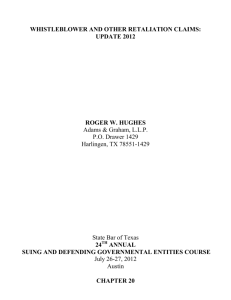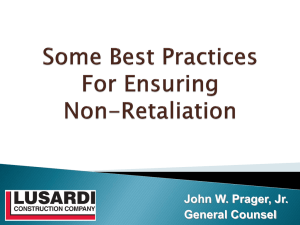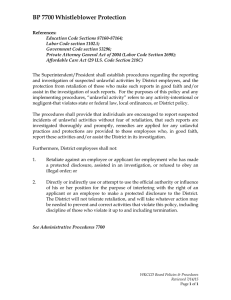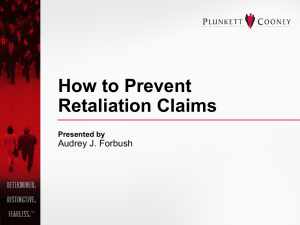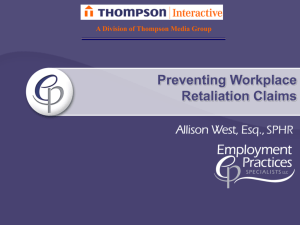The Employer Adviser
advertisement
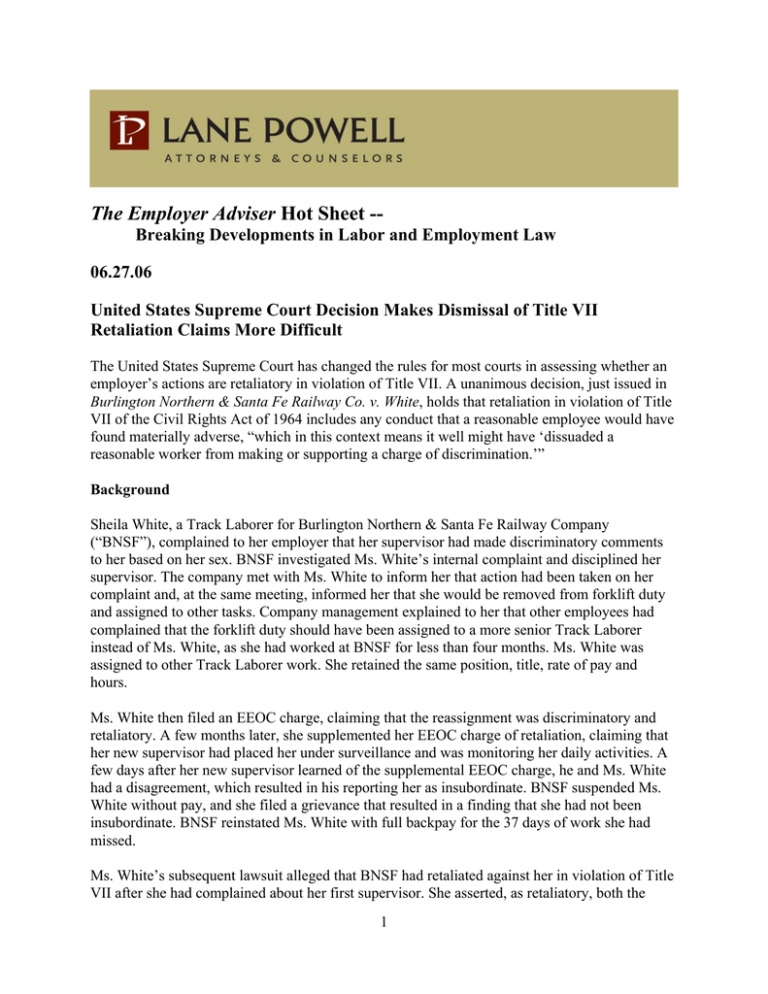
The Employer Adviser Hot Sheet -Breaking Developments in Labor and Employment Law 06.27.06 United States Supreme Court Decision Makes Dismissal of Title VII Retaliation Claims More Difficult The United States Supreme Court has changed the rules for most courts in assessing whether an employer’s actions are retaliatory in violation of Title VII. A unanimous decision, just issued in Burlington Northern & Santa Fe Railway Co. v. White, holds that retaliation in violation of Title VII of the Civil Rights Act of 1964 includes any conduct that a reasonable employee would have found materially adverse, “which in this context means it well might have ‘dissuaded a reasonable worker from making or supporting a charge of discrimination.’” Background Sheila White, a Track Laborer for Burlington Northern & Santa Fe Railway Company (“BNSF”), complained to her employer that her supervisor had made discriminatory comments to her based on her sex. BNSF investigated Ms. White’s internal complaint and disciplined her supervisor. The company met with Ms. White to inform her that action had been taken on her complaint and, at the same meeting, informed her that she would be removed from forklift duty and assigned to other tasks. Company management explained to her that other employees had complained that the forklift duty should have been assigned to a more senior Track Laborer instead of Ms. White, as she had worked at BNSF for less than four months. Ms. White was assigned to other Track Laborer work. She retained the same position, title, rate of pay and hours. Ms. White then filed an EEOC charge, claiming that the reassignment was discriminatory and retaliatory. A few months later, she supplemented her EEOC charge of retaliation, claiming that her new supervisor had placed her under surveillance and was monitoring her daily activities. A few days after her new supervisor learned of the supplemental EEOC charge, he and Ms. White had a disagreement, which resulted in his reporting her as insubordinate. BNSF suspended Ms. White without pay, and she filed a grievance that resulted in a finding that she had not been insubordinate. BNSF reinstated Ms. White with full backpay for the 37 days of work she had missed. Ms. White’s subsequent lawsuit alleged that BNSF had retaliated against her in violation of Title VII after she had complained about her first supervisor. She asserted, as retaliatory, both the 1 decision to take away her forklift assignment in September 1997 and her suspension without pay in December 1997. BNSF argued that these actions could not be considered unlawful retaliation under Title VII because Ms. White had never been moved out of the job for which she was hired and because she had received all her backpay upon the determination that she had not been insubordinate. BNSF lost at trial and in the Sixth Circuit Court of Appeals, and appealed the decision to the U.S. Supreme Court arguing that its actions could not be considered “retaliatory” under Title VII. BNSF wanted the Supreme Court to adopt the Fifth and Eighth Circuits' pro-employer standards regarding what is a materially adverse action. But the Supreme Court affirmed, concluding: (i) that Title VII’s prohibition against retaliation is broader than Title VII’s prohibition against discrimination, (ii) that the prohibition on retaliation includes a broad range of employer conduct, and (iii) that unlawful retaliation “is not limited to discriminatory actions that affect the terms and conditions of employment.” The BNSF v. White decision specifically holds that Title VII was intended to prohibit retaliation by an employer inside or outside the workplace. Further, the Court’s opinion makes clear that employer actions can be “retaliatory” if the plaintiff can show that a “reasonable” employee “well might have” been dissuaded from opposing discriminatory conduct by the employer’s adverse action. The opinion in BNSF v. White does articulate limitations on what may be considered retaliatory conduct under Title VII, reiterating that the statute “does not set forth ‘a general civility code for the American workplace.’” Accordingly, “petty slights or minor annoyances that often take place at work and that all employees experience” would not constitute actionable retaliation. Ultimately, however, the Supreme Court’s definition of what may constitute unlawful retaliation is broad. Although the alleged retaliation must be “materially adverse,” the definition of what is “material” is flexible and will not be the same for all employees. Thus, “an ‘act that would be immaterial in some situations is material in others.’” In the Supreme Court’s other words: “Context matters.” What This Means for Employers --- Good News and Bad News The good news: The Ninth Circuit will be forced to retreat from its previously very liberal and pro-employee standard on what constitutes a materially adverse action. The Supreme Court in effect rejected the Ninth Circuit's standard for determining a "materially adverse condition" and adopted the District of Columbia Circuit's "reasonable employee" standard. The District of Columbia Circuit's test is viewed as a somewhat more restrictive test, and thus, more employerfriendly, than what had been applied in the Ninth Circuit. The bad news: Employers are likely to see an increase in retaliation claims going to trial, rather than being dismissed on summary judgment. The BNSF v. White decision expands the scope of what constitutes “unlawful retaliation” in two ways: First, the Supreme Court held that unlawful retaliation can include conduct causing harm outside the workplace. Prior to this decision, courts have generally looked to whether there was a material adverse change to the employee’s work environment or conditions of employment, such as a decrease in pay or a demotion. 2 Second, the Supreme Court said unlawful retaliation includes harm that a “reasonable employee” would consider material. While the Court presented this standard as “objective,” the decision also stated that the standard “should be judged from the perspective of a reasonable person in the plaintiff’s position, considering all the circumstances.” For example, the Court explained, while a schedule change may seem immaterial to many employees, it “may matter enormously to a young mother with school age children.” It is likely that courts will now more frequently consider the plaintiff’s personal non-work circumstances when determining whether an employer initiated action is “materially adverse” to the plaintiff. The Supreme Court’s emphasis on the “context” of each situation will make it significantly more difficult for an employer to demonstrate that an action it took cannot “as a matter of law” constitute unlawful retaliation under Title VII. For example, even though Ms. White continued to work in the same position, she argued that the new tasks she was given after being removed from forklift duties were more arduous. The Supreme Court’s ruling allows such claims of “more arduous” work to be determined by a jury. As a result, employers can expect to see fewer trial courts willing to grant summary judgment rulings in favor of employers who face retaliation claims asserted under Title VII of the Civil Rights Act of 1964. For more information, please contact the Labor and Employment Law Practice Group at Lane Powell: 206.223.7000 Seattle 503.778.2100 Portland employlaw@lanepowell.com www.lanepowell.com We provide The Employer Adviser Hot Sheet as a service to our clients, colleagues and friends. It is intended to be a source of general information, not an opinion or legal advice on any specific situation, and does not create an attorney-client relationship with our readers. If you would like more information regarding whether we may assist you in any particular matter, please contact one of our lawyers, using care not to provide us any confidential information until we have notified you in writing that there are no conflicts of interest and that we have agreed to represent you on the specific matter that is the subject of your inquiry. © 2006 Lane Powell PC Seattle - Portland - Anchorage - Olympia – London Lawyers for Employers ™ 3

